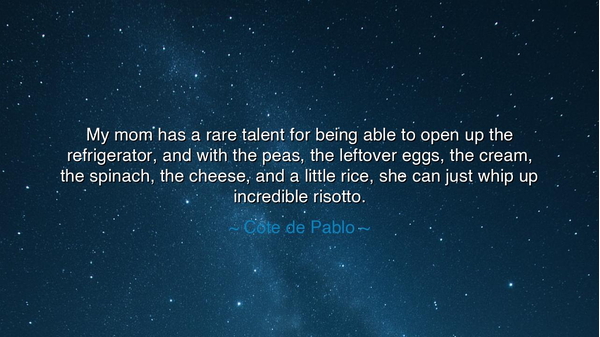
My mom has a rare talent for being able to open up the
My mom has a rare talent for being able to open up the refrigerator, and with the peas, the leftover eggs, the cream, the spinach, the cheese, and a little rice, she can just whip up incredible risotto.






Hear the words of Cote de Pablo, who speaks with warmth of her mother’s gift: “My mom has a rare talent for being able to open up the refrigerator, and with the peas, the leftover eggs, the cream, the spinach, the cheese, and a little rice, she can just whip up incredible risotto.” Though this sounds at first like a simple description of a meal, within it lies a timeless lesson about creativity, resourcefulness, and the hidden artistry of love.
The meaning of her words shines brightly: true talent is not always found in grand gestures or in great abundance, but in the ability to take what little one has and transform it into something greater. To turn scraps into a feast, to see not limitation but possibility—that is the art of living. Her mother’s risotto is more than food; it is a symbol of care, of presence, of finding abundance in the midst of simplicity.
The ancients honored this wisdom. In the humble hearth of every household, it was the mother or elder who could feed many from little, who could stretch a loaf of bread or a handful of grain into nourishment for the whole family. The Greeks praised Metis, the goddess of cunning wisdom, whose strength was not brute force but resourcefulness. So too here: the power to make something wonderful from leftovers is a reflection of ingenuity, of a mind and heart that see hidden potential where others see only waste.
History gives us many examples. During the long siege of Leningrad in World War II, families survived on scraps of flour, bark, and roots. Out of dire scarcity, they invented new ways of cooking, transforming fragments into meals that sustained body and soul. Though tragic, their creativity was a triumph of the spirit, proving again that the act of making food from little is not merely about survival—it is about dignity and hope. Cote de Pablo’s memory echoes this eternal truth: even in the kitchen, resilience becomes art.
Her words also carry emotional weight, for the risotto is not only remembered for its flavor, but for the bond it created. The meal became an act of love, a gesture of care that tied mother to child. Every bite carried not just nourishment, but the unspoken message: “I will make beauty out of what we have, for you.” Thus, the refrigerator was no longer a place of scarcity but of possibility, transformed by the alchemy of a mother’s heart.
The lesson, O seeker, is this: do not despise what is small, nor what appears incomplete. Whether in food, in art, or in life, the fragments before you may yet become something great. What matters is not how much you possess, but how you use it. Creativity thrives not in abundance but in limitation, where the mind is forced to stretch and the heart learns to give.
Practical is this counsel: when life feels poor in resources, look again with different eyes. Take the scraps of your days, the humble moments, the overlooked talents, and combine them with love and imagination. In doing so, you may create something of lasting beauty, whether a meal, a memory, or a masterpiece. And when you sit to eat, remember that food is not only sustenance for the body but a vessel for love and connection.
Thus Cote de Pablo’s words become more than a fond recollection—they are a teaching for generations: “My mom has a rare talent… she can just whip up incredible risotto.” Let us honor those who can turn little into much, let us learn from them the art of resourcefulness, and let us, too, transform the ordinary into the extraordinary through love, imagination, and care.






AAdministratorAdministrator
Welcome, honored guests. Please leave a comment, we will respond soon